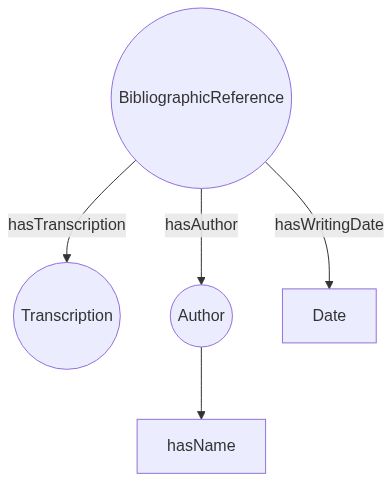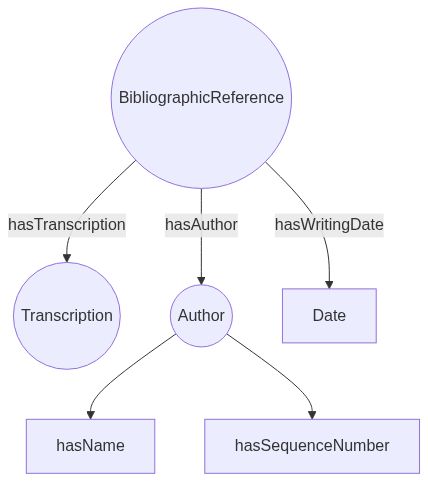New issue
Have a question about this project? Sign up for a free GitHub account to open an issue and contact its maintainers and the community.
By clicking “Sign up for GitHub”, you agree to our terms of service and privacy statement. We’ll occasionally send you account related emails.
Already on GitHub? Sign in to your account
Gravsearch result sorted on linked resource's property #1575
Comments
In your query, |
|
Also what if there are several dependent resources with several values? |
Not sure to understand ! But firstly is that possible in Sparql what I'm asking for? if it is not possible the question is closed! |
|
I have other cases where reverse the query starts to be very annoying and may be not performant because of space search. In the following example, I'm searching a PREFIX knora-api: <http://api.knora.org/ontology/knora-api/v2#>
PREFIX knora-simple-api: <http://api.knora.org/ontology/knora-api/simple/v2#>
PREFIX ll: <http://0.0.0.0:3333/ontology/0113/lumieres-lausanne/v2#>
CONSTRUCT {
?BibliographicNotice knora-api:isMainResource true .
?BibliographicNotice ll:hasContribution ?hasContribution .
?hasContribution ll:isContributor ?isContributor .
?isContributor ll:hasName ?hasName .
} WHERE {
?BibliographicNotice a ll:BibliographicNotice .
?BibliographicNotice ll:hasContribution ?hasContribution .
?hasContribution a ll:Contribution .
?hasContribution ll:isContributor ?isContributor .
?isContributor a ll:Person .
?isContributor ll:hasName ?hasName .
{
{
?BibliographicNotice ll:bibliographicNoticeHasTitle ?bibliographicNoticeHasTitle .
?bibliographicNoticeHasTitle knora-api:valueAsString ?bibliographicNoticeHasTitle_Value .
FILTER knora-api:match(?bibliographicNoticeHasTitle_Value, "*")
}
UNION
{
[... many other union there on BibliographicNotice resources]
}
ORDER BY ASC(?hasName) |
ok, got it, I didn't think that you have to group by on main resource... so we could maybe use an order by on the aggregated result of Test data: test_data.trig.zip And how I could order by the aggregated values of PREFIX rdf: <http://www.w3.org/1999/02/22-rdf-syntax-ns#>
PREFIX td: <http://test_data#>
SELECT
?biblio
(GROUP_CONCAT(?firstHasName) AS ?Agg_firstHasName)
WHERE {
?biblio rdf:type td:Biblio .
?biblio td:hasContrib ?hasContrib .
?hasContrib td:hasSeqNum ?hasSeqNum .
FILTER(?hasSeqNum = 1) .
?hasContrib td:hasAuthor ?firstHasAuthor .
?firstHasAuthor td:hasName ?firstHasName .
} GROUP BY ?biblio
ORDER BY ASC(?Agg_firstHasName) |
|
@tobiasschweizer, @benjamingeer It would be really good to have your feedbacks on this if you can spare some time. We are in a dead end and don't know how we could deliver this feature requested by Lumieres.Lausanne. Do you think Gravsearch wouldn't be able to perform this query any time soon and we should look for a workaround ? No idea which one yet... |
|
This limitation is part of the current design of Gravsearch. In any case, it only makes sense to order by single values, not by multiple values. Is there a 1:1 relationship between a
With https://stackoverflow.com/a/47460929 Anyway, I think it would be worth thinking about adding support for But this would take some time to develop. Since |
|
The modeling is not the issue, we have 2 other cases with doesn't involve this peculiar example. Here is another one: a And we would like to be able to display |
|
My suggestion was just a workaround, because as I said, if we do implement something like this, it will take time, and it sounds like you need a solution quickly. And you haven't answered my question: could there be multiple sort keys for each item that needs to be sorted? Could there be more than one |
|
Well I only wanted to make a partial answer and leave the rest to @gfoo. There is only one And you are right, we need a solution quickly... Or we could go in production without and implement it in the following months, when/if the feature is supported in Gravsearch. But I think it would make sense, right? |
|
If there can be more than one I think that if you need a workaround quickly, it will have to involve a change to your ontology, to ensure that all your sort keys are in the main resource. Longer term, once we understand better what your requirements are, we can see if it's possible to do what you want in SPARQL (and hence in Gravsearch). |
|
(a change to your ontology, or a change to your Gravsearch queries) |
|
Changing the ontology now is not an option. We would rather not provide the feature at all (but maybe later) than change the ontology now because the ontology and the web application for this project are very complicated and we are to release around mid February. |
OK, but I'm not sure it's possible to do that in SPARQL. If it is possible, it could involve some rather complicated SPARQL code, which Gravsearch would have to generate. Implementing that could be a lot of work. One thing you could do, if you want to help, is figure out how to do this yourself in a SPARQL SELECT query. You could start by writing a Gravsearch query that's close to what you want (without the ORDER BY), and get the resulting generated SELECT prequery by uncommenting this line: Then see if you can modify the prequery so it does what you want. Then we would have a proof of concept and something to start with. |
this is what I've tried to explain in my comment above #1575 (comment) (with simplified rdf data of course) With a In all our cases we can select one value, so the concat order is no more a problem. In the gravsearch query at the beginning of this issue I used |
|
@gfoo OK, thanks, now I understand. If there is always a way to select only one value, then I think this becomes much easier to implement (otherwise I think we would need a subquery, which I would really rather avoid because it introduces all sorts of difficulties). @tobiasschweizer would you be able to look at this with me when I'm in Basel next month? |
Yes, sure. But unfortunately I cannot make any promises by when this could be implemented. |


I try to sort the result of a gravsearch query according to a linked resource's property. In my following example, I'm searching for
DraftPersons, but I want to sort the result on linked resourcePersonhasNameproperty and I get this error:{ "knora-api:error": "org.knora.webapi.GravsearchException: Variable ?hasName is used in ORDER BY, but does not represent a value of the main resource", "@context": { "knora-api": "http://api.knora.org/ontology/knora-api/v2#" } }Is that a bug?
(As workaround, I think I can reverse the query to have
Personas main resource)The text was updated successfully, but these errors were encountered: